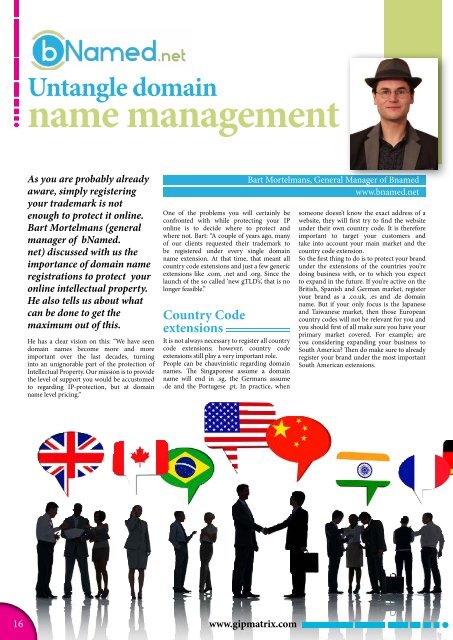Global IP Matrix - Issue 1
The Global IP Matrix is a brand new Intellectual property law magazine with a difference. We have designed a less formal looking, impressive and eye-catching publication with the 'off the shelf' appeal that still holds vital up to date literature and features that will keep you wanting to read more. We have collaborated with two of the world's leading IP Law firms to bring you an IP magazine designed and overseen by lawyers for lawyers. After spending many years in IP and attending hundreds of conferences all over the world we are very aware of our audience and their needs so we are confident that this new publication will supply you with the right content and keep you interested. Regular content will consist of: • Interview feature or featured articles • Independent columnists • Q&A's • Law firm profiles • Movers and shakers + much more
The Global IP Matrix is a brand new Intellectual property law magazine with a difference. We have designed a less formal looking, impressive and eye-catching publication with the 'off the shelf' appeal that still holds vital up to date literature and features that will keep you wanting to read more.
We have collaborated with two of the world's leading IP Law firms to bring you an IP magazine designed and overseen by lawyers for lawyers.
After spending many years in IP and attending hundreds of conferences all over the world we are very aware of our audience and their needs so we are confident that this new publication will supply you with the right content and keep you interested.
Regular content will consist of:
• Interview feature or featured articles
• Independent columnists
• Q&A's
• Law firm profiles
• Movers and shakers
+ much more
You also want an ePaper? Increase the reach of your titles
YUMPU automatically turns print PDFs into web optimized ePapers that Google loves.
Untangle domain<br />
name management<br />
As you are probably already<br />
aware, simply registering<br />
your trademark is not<br />
enough to protect it online.<br />
Bart Mortelmans (general<br />
manager of bNamed.<br />
net) discussed with us the<br />
importance of domain name<br />
registrations to protect your<br />
online intellectual property.<br />
He also tells us about what<br />
can be done to get the<br />
maximum out of this.<br />
He has a clear vision on this: “We have seen<br />
domain names become more and more<br />
important over the last decades, turning<br />
into an unignorable part of the protection of<br />
Intellectual Property. Our mission is to provide<br />
the level of support you would be accustomed<br />
to regarding <strong>IP</strong>-protection, but at domain<br />
name level pricing.”<br />
One of the problems you will certainly be<br />
confronted with while protecting your <strong>IP</strong><br />
online is to decide where to protect and<br />
where not. Bart: “A couple of years ago, many<br />
of our clients requested their trademark to<br />
be registered under every single domain<br />
name extension. At that time, that meant all<br />
country code extensions and just a few generic<br />
extensions like .com, .net and .org. Since the<br />
launch of the so called ‘new gTLD’s’, that is no<br />
longer feasible.”<br />
Country Code<br />
extensions<br />
It is not always necessary to register all country<br />
code extensions; however, country code<br />
extensions still play a very important role.<br />
People can be chauvinistic regarding domain<br />
names. The Singaporese assume a domain<br />
name will end in .sg, the Germans assume<br />
.de and the Portugese .pt. In practice, when<br />
Bart Mortelmans, General Manager of Bnamed<br />
www.bnamed.net<br />
someone doesn’t know the exact address of a<br />
website, they will first try to find the website<br />
under their own country code. It is therefore<br />
important to target your customers and<br />
take into account your main market and the<br />
country code extension.<br />
So the first thing to do is to protect your brand<br />
under the extensions of the countries you’re<br />
doing business with, or to which you expect<br />
to expand in the future. If you’re active on the<br />
British, Spanish and German market, register<br />
your brand as a .co.uk, .es and .de domain<br />
name. But if your only focus is the Japanese<br />
and Taiwanese market, then those European<br />
country codes will not be relevant for you and<br />
you should first of all make sure you have your<br />
primary market covered. For example; are<br />
you considering expanding your business to<br />
South America? Then do make sure to already<br />
register your brand under the most important<br />
South American extensions.<br />
gTLD’s as an<br />
alternative<br />
So country codes remain important but the so<br />
called ‘new gTLD’s’ can offer a nice alternative.<br />
These ‘new gTLD’s’ such as .shop, .hosting,<br />
.computer, .london, .paris, .berlin, .bank,<br />
.insurance,... were launched a few years ago<br />
and most have been completely enrolled.<br />
Bart: “We must also be honest that most<br />
gTLD’s have only limited popularity. As said<br />
a .de works best for Germany, but if you are<br />
headquartered in Berlin a domain name under<br />
.berlin can be a nice added extra. The same<br />
goes for .london, .paris, .brussels, .nyc,... Other<br />
new gTLDs have found their way to the general<br />
public. The .shop domain is a good example<br />
of this. The next, possibly popular gTLD that<br />
is being launched is .app. There is already<br />
a healthy amount of interest for this, but of<br />
course it always remains to be seen.<br />
According to Bart the ‘new gTLD’s’ can also be a<br />
way to show your core business. If you’re a bank<br />
or insurance company a .bank or .insurance<br />
domain name is a nice extra. It’s immediately<br />
clear what services you’re offering. Moreover<br />
before you can register your name under .bank<br />
or .insurance, you need to run through a whole<br />
registration process so if you register your<br />
name under those extensions, it also shows<br />
you’re trustworthy. Obviously bNamed can<br />
help and assist you every step of the way.”<br />
Protect yourself,<br />
are you sure you are<br />
secure?<br />
Protecting your <strong>IP</strong> online is important but are<br />
you sure your protection itself is secure?<br />
This can be done via centralising your domain<br />
names with an independent registrar. The<br />
relationship with a web designer can sometimes<br />
blur or you may receive a better offer from<br />
another webhoster. If your domain names are<br />
managed by an independent party you can<br />
switch quickly and you can even combine<br />
different providers for different services, like<br />
webhosting and e-mail. You’ll never have to<br />
worry that your precious intellectual property<br />
(for that’s what domain names are) is taken<br />
hostage because of a dispute regarding an<br />
invoice for that web design that never got off<br />
the ground.<br />
Centralising domain<br />
names<br />
In many companies domain names are<br />
currently registered here and there. This<br />
easily causes things to go wrong. If you miss<br />
a renewal deadline, your domain name can go<br />
offline or can even be lost completely. In many<br />
cases it’s also not clear who has control over the<br />
domain name and who has the correct login<br />
information when an update is needed. As<br />
seen, way too often, names are even registered<br />
in the name of a branch, a local reseller who<br />
now no longer exists or even an ex-employee.<br />
The centralisation of the domain names<br />
solves those problems and is also financially<br />
interesting, because grouping more names, of<br />
course, also means a bigger discount.<br />
Name Server<br />
diversification<br />
Another way to protect yourself and make sure<br />
your domain names keep functioning is name<br />
server diversification.<br />
Bart: “The name servers are the basis of<br />
your domain name. If they don’t function,<br />
nothing does. In the past some major internet<br />
companies, such as Twitter and Spotify, went<br />
offline for a couple of hours because their very<br />
trustworthy name server provider was attacked<br />
by a so called DDoS. The attack wasn’t aimed<br />
directly against Twitter or Spotify but they<br />
were ‘collateral damage’.”<br />
The conclusion is clear: there’s only one way<br />
to make sure you don’t get hurt if your onlineneighbour<br />
is attacked and that’s by combining<br />
different name server services. Bart: “We for<br />
example offer you the possibility by one simple<br />
click to combine our name servers with the<br />
cloud name servers of Google. If you wish you<br />
can also add special anti-DDoS name servers.<br />
16 www.gipmatrix.com www.gipmatrix.com<br />
17












